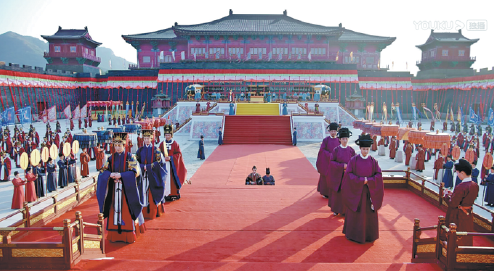A glimpse into the past
By Wang Kaihao (CHINA DAILY) Updated: 2019-12-04 00:00Television or online streaming can offer tantalizing glimpses of bygone eras. Costume dramas, by definition, show the fashion of yesteryear in stunning clarity. But, aside from the clothes, social mores, politeness, manners and deference provide an elegant backdrop to unfolding plots. The Longest Day in Chang'an, broadcast over the summer, was no exception. The historical thriller, aired first on online streaming media platform Youku, put into sharp focus the intricate aesthetics of the Tang Dynasty (618-907). Viewers were gripped by the rituals, cuisine, architecture and daily life of the era.
Royal Nirvana, a 60-episode series, began airing in November also through Youku, and again assuaged the viewers' appetite for, what is literally, traditional appeal.
It tells how Xiao Dingquan, a timid prince, grows into a brave leader who is devoted to the country's stability and prosperity, and how he overcomes the various crises that arise with alarming frequency.
The story, adapted from a popular online novel, is set in a fictional ancient Chinese dynasty. However, the clothes, decorations and rituals all point to the Song Dynasty (960-1279), a period renowned for its elegant yet simple artistic style. It is generally considered a boom time of cultural brilliance and social prosperity.
Yang Wenjun, director of the series, admits that like many successful fictional historical dramas of the past decade, the producers of this show wanted to have a production that is authentic in its depiction of the time.
"It may be fiction, but historical detail is essential," director Yang said during a recent public screening of the series at a Beijing cinema. "It was essential to follow convention, particularly when we borrowed rituals from the Song Dynasty."
Only by so doing, he says, can an expression of beauty become more "implicit", and better fit into the context of traditional culture.
Yang mentions that "China is a land of propriety". This puts an onus on a director to portray ceremonial rituals, as well as the observed formalities in interpersonal relationships.
Rites have been a core element of Confucianism. Sages, who've been widely worshipped in traditional culture, have been role models who could practice their philosophical principles in everyday life, even in trivial details, says Gao Jing, chief ritual director of the series.
For example, Xiao the protagonist is inspired by Confucian principles when tackling serious situations. When Xiao falls into a fatal dilemma, he still takes some time to straighten up without fear, following the behavior codes like that of ancient Confucian sages. And when the lead female role, Lu Wenxi, meets her beloved, like every maiden of that time in a traditional Chinese family, she communicates not face-to-face, but sitting behind a folding screen, as was required by the societal rules of the period.
Gao says the production team was able to draw on ancient knowledge. The Twenty-Four Histories, collective term to describe 24 officially-compiled history books, has 56 volumes elaborating on "rites", Gao says. In History of the Song Dynasty alone, there are 28.
Besides history books, other Song-Dynasty literature provided references, ranging from the 12th-century official list of rites released by the royal court, to the famous prose collection, Reminiscences of the Eastern Capital, and Shilin Guangji, an encyclopedia for everyday life.
Detail is all-important. For example, in scenes involving drinking tea, Daguan Chalun, a book written by emperor Zhao Ji of the Song Dynasty-a notoriously weak ruler but a talented follower of the fine arts-highlighted how to roll tea powder and properly add water. The sipping of the liquid provided a chance to communicate rather than drink.
Besides the depiction of the tea ceremony in the series, the handwritten letters by the prince followed the style of the emperor's calligraphy.
How actors walk, swing their long sleeves gracefully, their posture and bowing correctly also enhances authenticity, actor Bao Dazhi says. "These rites are far removed from modern life, but it's good to learn how to act out the history. It's a must for professionalism."
He recalls one scene where he had to dance while holding a hu before talking in the royal court. In ancient China, a hu was a piece of wood used to remind high officials of their talking points when meeting emperors at the palace.
To give audiences a fuller picture of that time, grand ceremonies were acted out in the show, like the crown prince's coming-of-age ceremony, his royal wedding, and his teacher's funeral, although lengthy ceremonies were simplified, Gao says.
It may be of the past, but the series can offer inspiration for modern times, Gao adds.
"People generally follow Western business etiquette today," she says, but also points to a revival of traditional customs.
"The values of traditional customs were based on respect and order, and this essence of traditional propriety may get more highlighted in our current everyday life."

- 'Cooperation is complementary'
- Worldwide manhunt nets 50th fugitive
- China-Japan meet seeks cooperation
- Agency ensuring natural gas supply
- Global manhunt sees China catch its 50th fugitive
- Call for 'Red Boat Spirit' a noble goal, official says
- China 'open to world' of foreign talent
- Free trade studies agreed on as Li meets with Canadian PM Trudeau
- Emojis on austerity rules from top anti-graft authority go viral
- Xi: All aboard internet express











